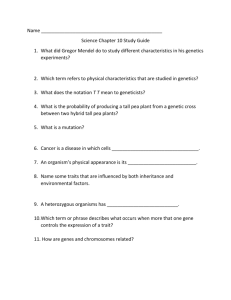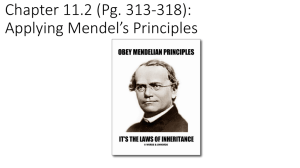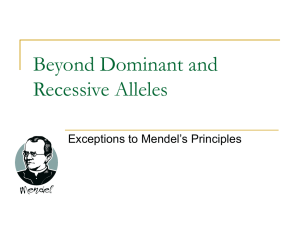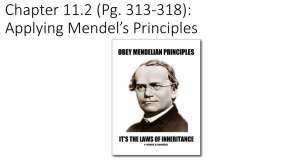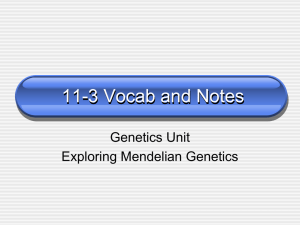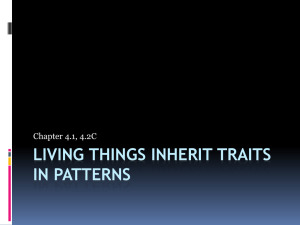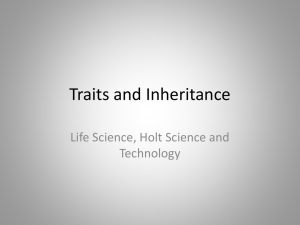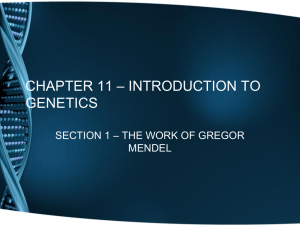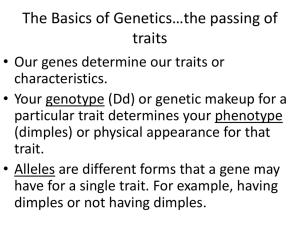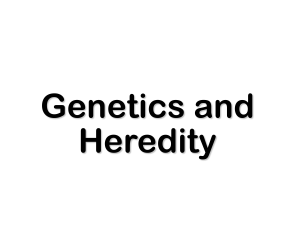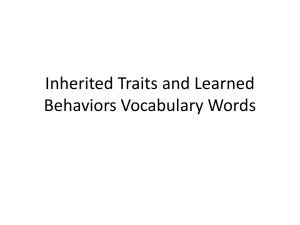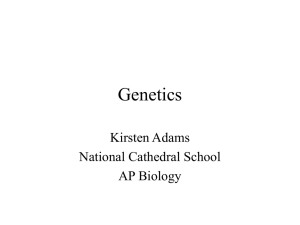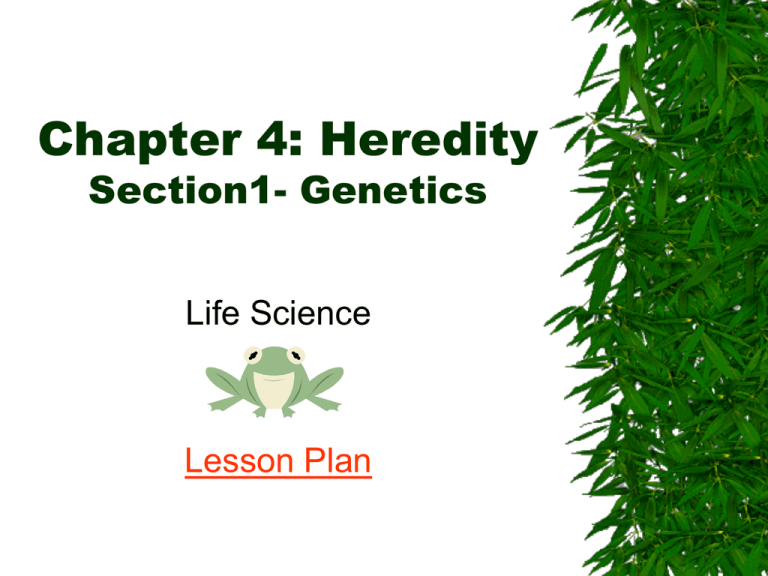
Chapter 4: Heredity
Section1- Genetics
Life Science
Lesson Plan
Inheriting Traits
Create a short list of characteristics
about yourself…
What is another name for these
characteristics?
TRAITS
Heredity
Heredity is the passing of traits from
parents to offspring.
Inherited Traits- Traits that are
passed from parents to their offspring
(through fertilization)
Genes are passed… but
what are genes?
Genes are sections of DNA on a
chromosome.
These genes on chromosomes control
the traits that show up in an organism.
– There are thousands of genes on a
chromosome
Alleles are different forms of a trait
that a gene may contain.
– There are 2 alleles for each gene
– 1 from mom and 1 from dad
Example: Height
– 1 allele is tall
– 1 allele is small
Alleles
alleles
a gene
B. Genetics- is the study of inherited
traits.
1. Gregor Mendel- The Father of
Genetics “The Man”
Mendel’s Experiment
Mendel studied the traits of Pea Plants
– Look Page 105
Crossed 2 Plants with different
expressions of the trait
– Example- Tall (T)& Short (t)
– Round R & Wrinkled r
Mendel’s Experiment
When the plants were crossed he
discovered that the new plant formed
looked like one of the two parents.
Take
a look…
Mendel’s Tall vs. Short Plants
VOCABULARY
3. Purebreds- offspring receives the
two same alleles for a trait (TT or tt)
VOCABULARY
4. Hybrids- offspring receives two
different alleles for a trait (Tt)
2 Types of Alleles
a.Dominant allele- covers up or
dominates the other trait
Represented by a Capital Letter
b. Recessive allele- the trait seems
to disappear
Represented by a lower-case letter
“Homo”zygous – an organism with 2
alleles for one trait that are the
same (written TT)
“Hetero”zygous – an organism with 2
alleles for one trait that are different
(written Tt)
Genotype-
the geneticmakeup of an organism (types
of letters used)
Phenotype- the way an organism
physically looks/behaves as a result
of its genotype.
Types of Words used: Tall, Short,
Blonde, Brown, etc.
The Use of
Punnett Squares
A Punnett Square can help you predict
what an offspring will look like.
“What’s the Probability of the
baby’s gender?”
A Punnett Square can help you
predict what an offspring will look like
1. Monohybrid: Offspring of parents
that differ in only one genetic
characteristic
Monohybrid Cross:
GG x gg
DYHIBRID CROSSES
2. Dyhybrid: Offspring of parents that
differ in TWO genetic characteristic
***USE FOIL to separate the combinations
F – FIRST
O – OUTSIDE
I – INSIDE
L – LAST
DIHYBRID EXAMPLE
Tall & Green
TtGg
x
TtGg
DIHYBRID EXAMPLE #2
Brown hair vs Blonde hair
AaBb
x
aaBb
Chapter 4
Part 2- Genetics Since
Mendel
Life Science
Question…
If you crossed Purebred Red fouro’clock flower with Purebred White
four-o’clock flower, what would the
offspring look like?
Actually…
they were PINK!?!?!
Incomplete Dominance- when two
homozygous parents combine, the
offspring results in a blended
phenotype
Combining Purebred Red & White
and produced Pink
Neither allele for a trait is Dominant.
The phenotype produced is mixed
between the two homozygous parents.
– The combining of Purebred Red &
Purebred White produced PINK plants.
What would happen if you crossed a
Red horse and a White horse?
PINK!?!?!
Just kidding…
ROAN
Although Mendel studied peas that
were controlled by two alleles, many
traits can be controlled by more than
two alleles…
Multiple Alleles
A trait that is controlled by Having
more than two alleles is controlled by
Multiple Alleles.
Traits controlled by Multiple Alleles
produce more than three phenotypes
of that trait.
Example (Flip to Page)
Example of Multiple Alleles…
Blood
Types: A, B, AB, and O.
– The O allele is recessive to both A and B
Other Worksheet…
Phenotype A - AA or AO Genotype
Phenotype B – BB or BO Genotype
Phenotype AB – AB Genotype
Phenotype O – OO Genotype
Polygenic Inheritance
Polygenic Inheritance- when a group
of gene pairs acts together to produce
one trait.
– Which creates more variety in
phenotypes
What would be an
example?
Many traits such as…Skin Color, Eye
Color, Hair Color, and Handspan are
traits produced by a combination of
genes.
Human Genes &
Mutations
Mutations:
a permanent change in
the DNA sequence
A mutation can be helpful, harmful, or
cause no effect.
Mutations
Chromosome disorders- caused by
more or fewer chromosomes than
normal
Downs Syndrome- caused by an
extra copy of chromosome 21
Recessive Genetic
Disorders
There are human genetic disorders
that are caused by Recessive Genes.
How could this occur?
Both parents contain the recessive
allele
Because parents are Heterozygous,
they do not show any symptoms
– (Called “carriers” for the trait.)
Cystic Fibrosis is a homozygous
recessive disorder.
Sex-Linked Disorders
An allele inherited on a sex
chromosomes ( X or Y ) is called a
sex-linked gene.
Inherited conditions are linked with the
X and Y chromosomes.
Example- Color Blindness is a sexlinked disorder caused by recessive
allele on the X chromosome.
Where did you get your
genes from?
Pedigrees
Pedigree-
used to follow or trace
traits through generations of a family.
No… not the dog food…
Section 3
III.
Advances in Genetics
A. Genetic Engineeringexperimentations that changes the
arrangement of DNA that makes up
a gene.
Types:
1.
Recombinant DNA
Inserting a useful section of DNA into
a bacteria
Example- Creating Insulin (Page
143)
2.
Gene TherapyWhen a “normal allele” is placed into
a virus, the virus then delivers the
normal allele when it infects a
specific cell. (Figure 13 Page 144)
May be used to control Cystic
Fibrosis and other disorders.
3.
Genetically Engineering PlantsPlants are created by genetically inserting
the desired genes of one plant into
another plant you want to show those
genes.
Also genetically engineered: ANIMALS
“Cloning”
Works Cited
www.coolclips.com
http://kentsimmons.uwinnipeg.ca/cm15
04/mendel.htm
www.classzone.com
www.dkimages.com
www.virtualsciencefair.org
www.scienceray.com

